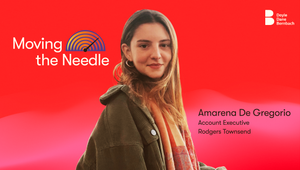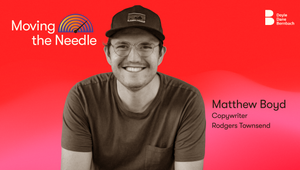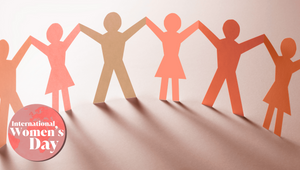
Media, the Great Recoupling and an Evolution into Something New Altogether

Eric Nelson joined St Louis agency Rodgers Townsend as director of media in April, tasked with leading the DDB agency's engagement planning, data analytics and tactical delivery across all media channels. According to a press release at the time, "the addition of the director of media position signals Rodgers Townsend recommitment to clients seeking the benefit of a singular team and united point of view".
Prior to joining RT, Eric has spent over 20 years in the industry working across categories including travel, CPG, retail, agriculture, healthcare and utilities. His experience includes large media focused agencies such as Initiative and MPG and full-service agencies like Osborn + Barr and R&R Partners.
LBB's Addison Capper picked his brains on his plans for RT and the media landscape in general; what spurred its 'decoupling' from creative and how the two are aligning moving forward.
LBB> Congrats on joining Rodgers Townsend. What was it about the opportunity that was too good to pass up?
Eric> Many things. Rodgers Townsend has always had a great reputation for exciting work. What I found through the process of getting to know the team a bit before signing on was how forward thinking an organisation they, now we, are. It was more than just vision, but a willingness and eagerness to put the effort and resources behind achieving great things. It was the sense of desire to be great, and cutting edge, without sacrificing the values that RT was founded on. When you add to that a stable of great brands that are asking us to be forward thinking, it was the type of opportunity that doesn’t come around very often. I was excited to join a leadership team looking forward.
LBB> This is an elevated position within the agency. What are your main aims and ambitions for it?
Eric> RT has always had media in one form or another, however as the media landscape is changing so fast, we want to continue to meet the needs of not only our brands but the customers they speak to. There remains a full commitment of resources not only within RT, but through the DDB Network. It was a part of the first question of why I’m here. The commitment up and down the organisation entrusting me to recreate and redefine and reposition what media is for Rodgers Townsend and our clients. My goals are to continue to evolve, innovate, grow and help our brands drive the next evolution of media. I envision RT media as dedication to not just collecting data and analytics but making them truly actionable and meaningful. There is a real sense of partnership with creative to better understand and engage with evolving media channels and how exciting and unexpected creative can play in new spaces.
LBB> The shift has been somewhat pushed by the agency's relationship with clients that grew through the pandemic. Can you speak a bit to that point and why this move is correct for them?
Eric> I think it is more than just the recent client success, but the continued commitment to media as a key pillar to build on. The pandemic showed how versatile media and data needs to be and the impact that actionable insights, not just data, are important to align with outstanding creative. Having the right message is critical and being able to adjust on the fly to place the message in front of the customer has led to our brands’ success through some very tough times.
LBB> A media department in a more traditionally creative agency signals somewhat of a 'recoupling' of creative and media. In your eyes, what is the value in bringing creative and media back together under one roof? What is in it for the agency's clients?
Eric> In my opinion it's always something that has had to work together in one way or another. The best campaigns often come from media and creative working together. The speed and advancements of media creates new and unique challenges not just for media teams but for creative as well. As the industry shifts to more programmatic and audience first approaches, an agency or brand that can start with media and creative together at the same table, speaking the same language and audience goals, great campaigns are launched. Thankfully at RT, those traditional silos were already being broken down. That’s why brands have seen the value in RT. Brands are looking for a holistic, truly integrated business solution that can deliver great thinking from start to finish.
LBB> What do you think spurred the 'uncoupling' of the two in the past? And with that in mind, how do you avoid those pitfalls moving forward?
Eric> The change is more a mindset and commitment. When media is viewed as strategic and more than tactical execution, that’s when creative and media can really come together. In the past, as media was viewed as executional, agencies didn’t always commit to the investment needed in a media group. So, it was easy to partner with a media only agency. Another factor was the rise of the ‘digital’ agency. Groups that only focused on digital aspects like search or social. An agency must be willing to commit to having a media team and invest in not just the tools but the talent as well. As long as an agency stays committed and continues to view media as a strategic asset to compliment creative, agencies can be successful. There will still be a place for media only or PR or creative only agencies. It’s about finding the right partners that can work together consistently. I believe that we have the right commitment here at Rodgers Townsend. It speaks to the success RT partners were able to have throughout the pandemic, having everything already in place to work together.
LBB> The world is a different place from that time, and you're now equipped with so much more technology and data. Is this even a 'recoupling' or the start of something entirely new? Why?
Eric> I think it’s something evolving vs. something entirely new. It’s what was so inviting about the opportunity here at Rodgers Townsend. Exactly what it is, I think we are still trying to figure it out and learn. The customers have changed, and agencies recognise that we need to meet those new demands and changes for our brands. There were certainly trends, but the pandemic hit the gas on certain shifts like streaming. There is a combination of mix and message that is fun and exciting. I’m re-energised getting to think of how early creative messages might work in a certain channel or pushing creative teams to add audio or an extra version of a mobile ad.
LBB> I imagine one of the benefits of this recoupling is the avoidance of silos and being able to create cohesive strategies across creative and media for clients. But how do you ensure that specialisms can still thrive under that structure? Is that important?
Eric> You are absolutely correct. Coming from a media only agency in my last role, back to a fully integrated team, I forgot how much I missed being engaged and part of the creative discussions and development. I think we are still learning what an evolved structure is and what I love about being at RT is that we are trying to use those specialties to the teams’ advantage. Sharing knowledge across functions and teams is critical. To steal from my agriculture experience, it’s like having a lot of free-range marketers that can come together at any given time for a project or campaign or a tweet. I think how we define specialisms are also starting to change. It’s part of how I’m looking to build our team, so that the specialism no longer restricts a person to just that part of the plan. While one person on the team may be strong in social media, another may have a passion for search or analytics. As a team we can learn both and lean on each other to educate the team and elevate each part of the strategy and execution.
LBB> You've been based in St Louis for a long time. How do you see the advertising industry in the city? What aspects make it unique and stand out?
Eric> Sometimes it’s hard to believe that I’ve been in St. Louis for over 12 years now. I think St. Louis is one of the most under-rated marketing spots in the country, and I like the underdog role, at least sometimes. When I helped found 314 Digital, I was surprised to realise how deep the talent and number of companies that were based right here. Everyone knows AB-InBev of course, but I think that overshadowed a lot of other great companies here. One thing that I find great about being a marketer in St. Louis is the dedication to the start-up scene. There are great organizations like Arch Grants, growing conferences like MDMC (Midwest Digital Marketing Conference), and workspaces that allow and encourage an entrepreneurial spirit across the city. I’ll always be a NYer, but as a marketer, I couldn’t ask for a better city to be in.
LBB> Any parting thoughts?
Eric> Just that I think it’s a truly exciting time to be in marketing and advertising. The pace of change and advancing technology… and I’m glad to be helping lead Rodgers Townsend into another evolution with the support of some great minds and talent at DDB across the globe.












